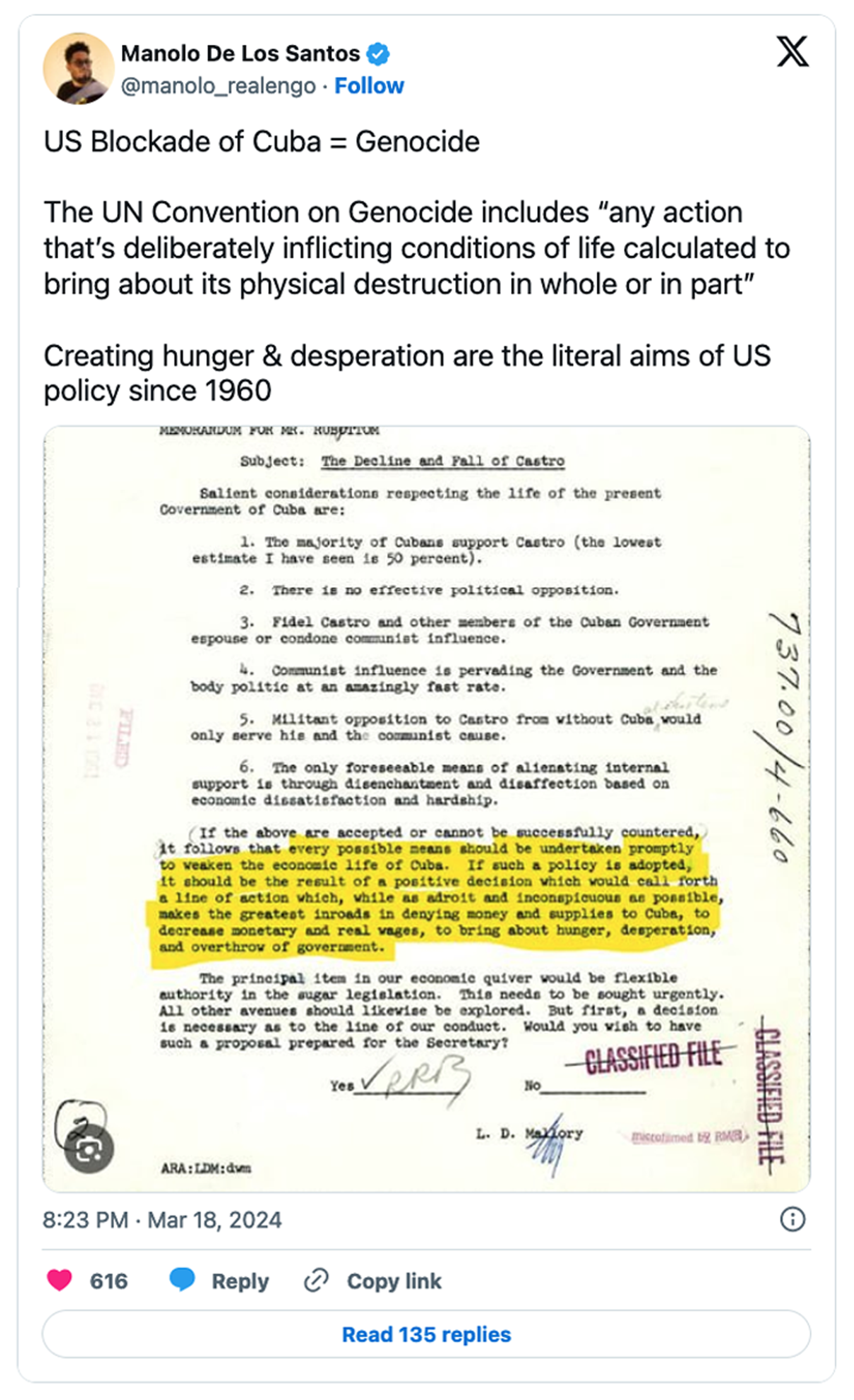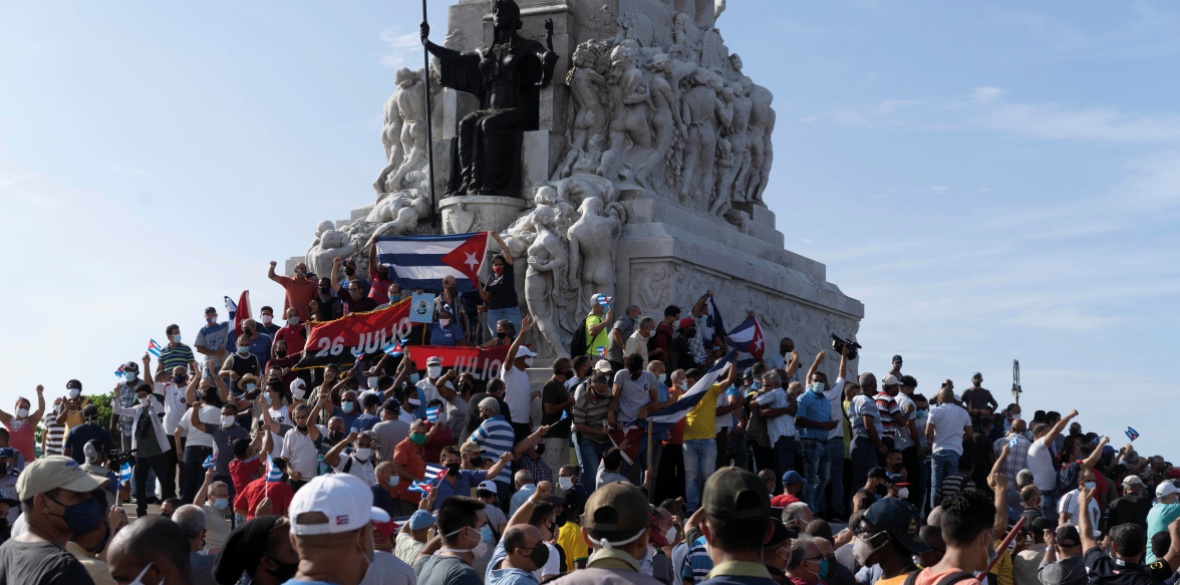This is the last article you can read this month
You can read more article this month
You can read more articles this month
Sorry your limit is up for this month
Reset on:
Please help support the Morning Star by subscribing here
ON MARCH 17, people in Santiago, a city in eastern Cuba, took to the streets to protest at the increased blackouts and food shortages they had been experiencing. The protest occurred as shortages generated by the US blockade of Cuba worsened across the island. Instead of lifting the blockade or taking Cuba off the state sponsors of terrorism list, the US government and corporate media have once again exploited the spontaneous protest to launch “a new counter-revolutionary media offensive,” claim US-based Cuba solidarity activists.
“If Biden really wants to stand by the Cuban people, if the US government were to actually care about the Cuban people, they would immediately end this blockade,” said People’s Forum executive director Manolo De Los Santos.
“In fact, with the stroke of a pen, they could immediately take Cuba off the State Sponsors of Terrorism list, which prevents Cuba from accessing financial services around the world and being able to trade freely.”
Immediately upon learning of the Santiago protest, the US embassy in Havana posted on X, “We urge the Cuban government to respect the human rights of the protesters and address the legitimate needs of the Cuban people.”
In fact, the Cuban government immediately responded to the protests. Beatriz Jhonson Urrutia, the highest level authority in Santiago, along with other provincial authorities went to the streets to engage in dialogue with those who had participated in the protest and listened to their concerns.
The response is a stark contrast to the “respect to human rights of … protesters” seen in the US. For the past six months, hundreds of thousands have been mobilising in cities and towns across the country to demand a ceasefire in Gaza, and national and local leaders have repressed, ignored, and ridiculed protesters and their demands.
US Assistant Secretary of State for Western Hemisphere Brian Nichols wrote on X, “The Cuban government will not be able to meet the needs of its people until it embraces democracy and the rule of law and respects the rights of Cuban citizens.”
Maria Elvira Salazar, a far-right member of Congress, who in March 2023 attempted to codify Cuba’s designation as a state sponsor of terror wrote about the Santiago protest, “It is 65 years of socialism; of repression, prison, death and exile; of blackouts, sicknesses and hunger. Cuba wants freedom!”
Media war
Meanwhile, international corporate media has also been quick to capitalise on the Santiago protest to push their own long-standing narrative about Cuba. For example, in its report on the protests, Argentina-based right-wing regional media outlet Infobae referred to Miguel Diaz-Canel as a “dictator,” and called the government a “regime” and “a Castrist dictatorship.”
It also heavily quotes a statement from the Madrid-based Cuban Observatory of Human Rights, which is a recipient of funding from the National Endowment for Democracy, a US government-funded foundation.
While the piece is mostly focused on unsubstantiated allegations of repressive actions carried out by Cuban security forces, it reserves one line at the end of the article to mention the real reasons that Cubans are dealing with challenging material conditions: “The pandemic, the toughening of US sanctions, and endogenous errors in the economic and monetary policy have intensified the structural problems of the Cuban system in the last three years.”
This general narrative is repeated in other news outlets across the region like NBC-owned Telemundo which also referred to the Cuban revolution as when “the Castro brothers took power in 1959.” The Telemundo article stated: “The protests, which are a rarity in a Cuba where power usually quickly suffocates any public outcry, are the largest since July 11 2021 when thousands of Cubans from the island took to the streets to cries of “We want freedom!’”
Cuba and Latin America reject US attempts at meddling
For many both on the island and outside, the response by US officials and corporate media to the protest on March 17 represents a clear attempt to weaponise the real material challenges facing Cubans due to the tightening of the blockade in order to push regime change. In fact, as many point out, this is precisely a goal of the blockade.

ALBA-TCP, a Latin America and Caribbean regional platform for economic and political co-operation, released a statement on March 18 in response to the statements of US officials, to “ratify our strong solidarity with the government and the Cuban people.”
“The member countries of ALBA-TCP … support their legitimate denunciation against the enemy campaigns, and we recognise their tireless efforts to overcome all the difficulties, a consequence of the brutal and illegal economic, commercial and financial blockade imposed by the US government, which since the Lester Mallory Memorandum has been causing deprivation for the Cuban people to justify external intervention.” The regional platform declared it “categorically rejects the permanent hostility, incitement to subversion and interference of the US against [Cuba].”
The Foreign Ministry of Cuba released a statement on March 18 informing that Deputy Minister Carlos Fernandez de Cossio had summoned the US Charge d’Affaires Benjamin Ziff to convey the “firm rejection of the interference and slanderous messages of the US government and its embassy in Cuba regarding the internal affairs of the Cuban reality.”
In the statement, the ministry declared: “If the US government had a minimal and honest concern for the welfare of the Cuban population, it would remove Cuba from the arbitrary list of states that allegedly sponsor terrorism; it would put an end to the persecution of fuel supplies that the country needs to import; it would stop pursuing every financial transaction of Cuba in the world; it would put an end to the rude persecution against Cuba’s medical co-operation programmes in the world; it would stop intimidating businessmen, visitors, artists and any person who feels the interest and the right to interact with the Cuban people.”
This article appeared on www.peoplesdispatch.org.









